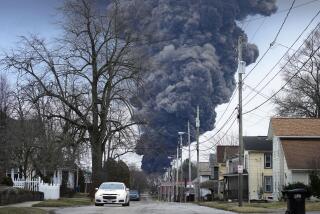It <i> Can’t</i> Be Shrugged Off
- Share via
Government usually has to strain to make a case for regulating an industry in the name of public health and safety. With Union Carbide Corp. it is different. The company has made its own compelling case for far more stringent policing of its chemical operations.
The latest Union Carbide accident apparently gave most people around its Institute, W.Va., plant nothing more lasting than a nasty scare--although 14 were still hospitalized Tuesday, shaking off the effects of aldicarb oxime; at best it irritates the eyes, and at worst it causes vomiting and collapse.
But what about the next accident? The company shrugged off Sunday’s accidental release of chemicals on the ground that they were not as lethal as those that killed 2,500 people last December at a similar Union Carbide plant at Bhopal, India. The reason that they were not more lethal is that the really deadly stuff--methyl isocyanate--had not been mixed into the other chemical when three gaskets ruptured, a backup system failed to trap escaping gases and a computer malfunctioned, leading the supervisor to believe that the gases would not drift beyond the plant gates.
Some company spokesmen treated the episode as though it were nothing more than a public-relations gaffe, one calling it “ . . . hysteria over a little leak.” A chemical industry lobbyist said that “ . . . it wasn’t something that happened because the plant didn’t work,” as though it was something that happened because the plant did work.
It is reasonable to expect that, after Bhopal, Union Carbide did everything in its power to demonstrate that an accident even remotely similar to the catastrophe in India could not happen here. Why its efforts failed deserves the closest examination.
A bill sponsored by Reps. Henry A. Waxman (D-Los Angeles), Timothy E. Wirth (D-Colo.) and others is a good place to start. The bill, which would set more rigid standards for safety systems that would reduce the chances either of sudden releases or slow leaks, is stalled in committee.
The committee should schedule new hearings so that witnesses can pin down the causes of the Institute accident and compare those causes with the standards in the bill.
If, as seems likely, the tougher requirements of the bill would make accidents like that of last Sunday less likely, they should be enacted into law without delay on the ground that Union Carbide has made a compelling case for such action.
More to Read
Inside the business of entertainment
The Wide Shot brings you news, analysis and insights on everything from streaming wars to production — and what it all means for the future.
You may occasionally receive promotional content from the Los Angeles Times.










